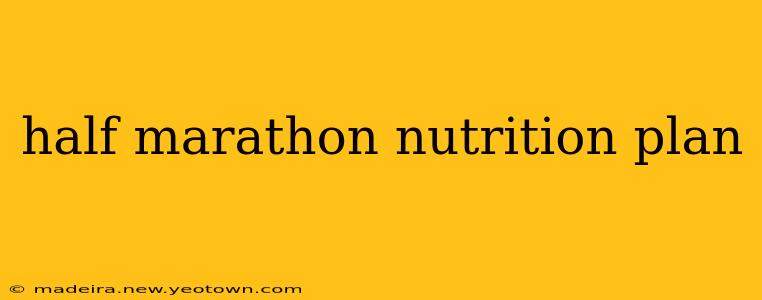The starting gun blasts, adrenaline surges, and you're off! But a successful half marathon isn't just about training your legs; it's about fueling your body for optimal performance. This isn't a one-size-fits-all approach, but a roadmap to help you discover the perfect nutrition plan for your half marathon journey. Think of this as your personal guide to conquering those 13.1 miles.
What Should I Eat the Week Before a Half Marathon?
The week leading up to race day is crucial. You're not trying to lose weight; you're trying to optimize your energy stores. Think of your body as a finely tuned machine – you wouldn't put low-grade fuel in a Ferrari, would you? This week is about consistency and familiar foods. Avoid anything new or experimental that might upset your stomach.
Stick to your regular training diet, focusing on complex carbohydrates like whole grains, fruits, and vegetables. These provide sustained energy release, preventing those dreaded mid-run energy crashes. Lean proteins, like chicken or fish, will support muscle repair and recovery. Hydration is key – aim for consistent water intake throughout the week.
Avoid drastic dietary changes or intense carb-loading. Gradual increases in carbohydrate intake in the days leading up to the race are generally sufficient for most runners.
What Should I Eat the Day Before a Half Marathon?
The day before your race is about maintaining energy levels and ensuring easy digestion. A light, easily digestible dinner is key. Think lean protein, complex carbs, and plenty of fluids. Avoid heavy, greasy foods or anything that might cause gastrointestinal distress.
A good example would be grilled chicken breast with brown rice and steamed vegetables. Stay hydrated, but don’t overdo it—you don’t want to be spending half the night in the bathroom. Your goal is to feel energized and comfortable, ready to tackle the race ahead.
What Should I Eat the Morning of a Half Marathon?
This is about fueling up for the race without weighing you down. You want something easily digestible that provides quick and sustained energy. Avoid anything too high in fiber or fat, as these can cause stomach upset during the run. A good breakfast could be toast with a thin layer of peanut butter or oatmeal with berries. Again, hydration is crucial.
What Should I Eat During a Half Marathon?
This depends largely on the race distance and your personal preferences. For a half marathon, you'll likely need to consume something during the race, especially if it's longer than 90 minutes. Many runners find energy gels or chews easy to consume while running, providing a quick boost of carbohydrates. Water or sports drinks are essential for maintaining hydration. Practice consuming your chosen fuel during your training runs to determine what works best for your body.
How Much Water Should I Drink Before, During, and After a Half Marathon?
Hydration is paramount. Start hydrating the day before the race, and continue to sip water regularly throughout the race. The amount you need will depend on factors like temperature, humidity, and your individual sweat rate. Don't wait until you're thirsty; by then, you're already dehydrated. After the race, replenish fluids lost through sweat and respiration.
What Should I Eat After a Half Marathon?
Post-race nutrition is crucial for recovery. Your body needs to replenish glycogen stores and repair muscle tissue. Aim for a meal that contains carbohydrates and protein within 30-60 minutes of finishing the race. This could be a banana with a protein smoothie or a turkey sandwich on whole-wheat bread. Continue to hydrate well throughout the recovery period.
This half marathon nutrition plan is designed as a guide. Every runner is different, and finding what works best for your body is key. Experiment during training, listen to your body, and adapt your plan accordingly. Remember, a well-fueled body is a happy running body – and a body that's ready to conquer that 13.1-mile challenge!

